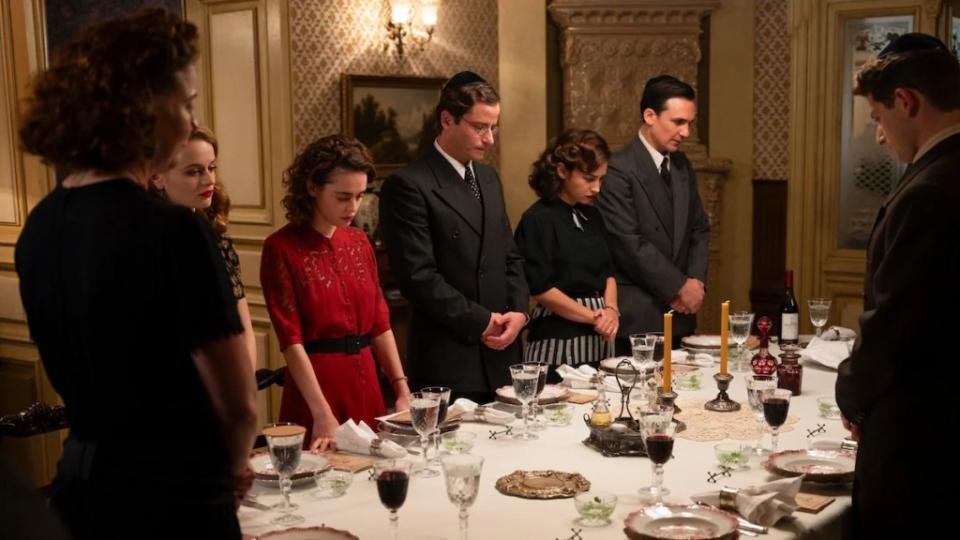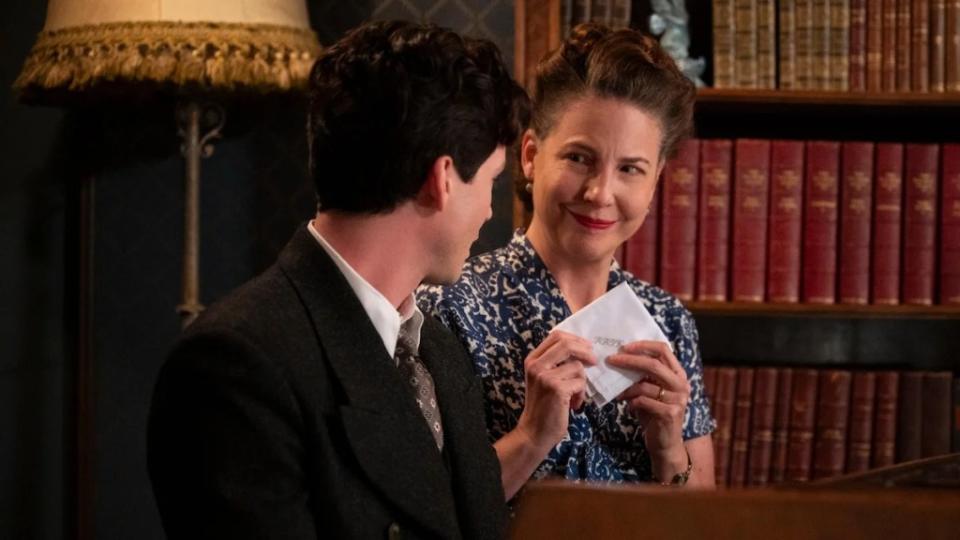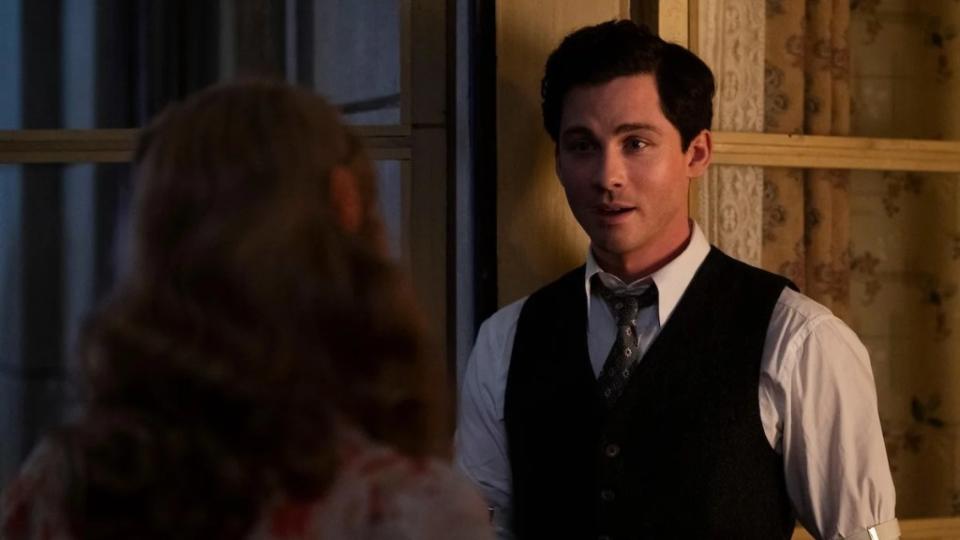‘We Were the Lucky Ones’ Review: Joey King Stands Out in Tragic Holocaust Story
- Oops!Something went wrong.Please try again later.
“We Were the Lucky Ones” — the Hulu limited series based on the New York Times bestselling novel by Georgia Hunter — follows the Kurc parents and their adult children as they are torn apart by the inhumane horrors of the Holocaust. Scattered across multiple countries, this is the story of their individual struggles to survive.
The story kicks off in 1938, as the Kurc family gathers for Passover at their home in Radom, Poland. The energy is of comfort, connection and camaraderie; a potential romance is kindled; discussion of music, babies and career aspirations fill the air. They’re unfazed by rumors of violence and harassment against Jews. The prospect of war is furthest from their minds.
Six months later, Germany invades. The Nazi occupation of Poland marks the beginning of World War II.

Joey King and Logan Lerman star as siblings Halina and Addy Kurc. An impressive collection of talent joins them here to bring the Kurc family to life: Henry Lloyd-Hughes as Genek Kurc, Hadas Yaron as Mila, Lior Ashkenazi as Sol, Amit Rahav as Jakob and Robin Weigert as Nechuma. This family provides the emotional foundation for the story. They’re the ones we’re rooting for. The fact that their characters are inspired by real people makes “We Were the Lucky Ones” an emotional gut punch.
For six years, the world watched as Hitler’s regime gained influence. In the decades since, there has been a collection of notable pieces of entertainment that dissect these awful events from many perspectives — be it from the eyes of those in prison camps, military personnel or the German army.
On the surface, one might expect “We Were the Lucky Ones” to be a similar retread of this upsetting time in our history. It’s not. Based on Hunter’s surprising discovery that her family has ties to the Holocaust, the author delved deep into many years of research about her ancestry to fill in the blanks. This limited series recalls everything she discovered, much like her book before it.
As a work of historical fiction, the author took creative license to account for certain missing pieces in the narrative puzzle where necessary. That helped inform her decision to write the book as a sweeping adventure instead of a Holocaust memoir. It’s what sets this series apart from others of a similar ilk.
One of the show’s biggest draws is the global nature of its storytelling. While each episode focuses on a specific character’s journey, a throughline of perseverance and strength emerges as their stories unfold. Usually, Holocaust stories portray Jewish people as victims and there’s truth to that. But “We Were the Lucky Ones” shies away from that trope.
As tragic as the series can be at times, acts of defiance are found in every episode. Smuggling food and medicine, falsifying IDs and performing a Jewish wedding ceremony in secrecy are just some of the examples of resistance shown throughout its eight episodes. A fake foreskin is even implemented in a scene to save someone from imprisonment. And all of this is based on true events.
Even if we all know the shocking number of those slaughtered during Hitler’s six-year reign, these stories of resilience amid a backdrop of deadly persecution are important pills to swallow.

It’s an integral detail to Hunter’s story that the Kurc family members remain split up throughout much of “We Were the Lucky Ones.” That choice is compelling for a literary work of historical fiction. But as a television show, it’s a risky choice. This is an ensemble series, so the whole is certainly greater than the sum of its parts. However, some individual character storylines are certainly compelling to watch. But others are not, which combined with uneven pacing, makes getting through some episodes more difficult than others.
There’s been an uptick of World War II-related dramas to hit the small screen in recent years, which may be a result of the times we’re currently living in. Shows like Nat Geo’s “A Small Light,” Netflix’s “All the Light We Cannot See,” Prime Video’s “Hunters” and Apple TV+’s “The New Look” and “Masters of the Air” have all taken different looks at the war, the Holocaust and the far-reaching impact these events have had on the world as a whole.
While “We Were the Lucky Ones” touches on all those things, the show differentiates itself by staying true to its central theme of family. The world may be falling apart around them, but it’s the Kurc family’s drive to see a future where they can proudly practice their religion and celebrate certain cultural touchpoints central to their identity – without the threat of being punished, ostracized, imprisoned or murdered for doing so – that carries the series to its satisfying conclusion.

As for standouts among the cast, King is the one to watch. She again proves herself as a powerhouse actress, delivering a knockout performance as Halina. Weigert unleashes a raw emotionality as Nechuma, the family matriarch. As for Lerman, his Addy — a character inspired by Hunter’s real-life grandfather — is sophisticated, stoic and soft-spoken.
The stellar talent flows freely among everyone who appears on screen. Supporting players like Sam Woolf (who plays Halina’s love interest Adam), Eva Feiller (who plays Jakob’s girlfriend Eva) and Moran Rosenblatt (who plays Gerec’s wife Herta) deliver cutting performances that further bolsters the impeccable work done by the cast and crew.
“We Were the Lucky Ones” is not an easy binge, so kudos to Hulu for opting to release episodes weekly. The show does not pull punches when it comes to the violent acts committed against Jews. Depictions of pogroms, a slaughter over a mass grave, and one character’s mission to smuggle her toddler to live with a different family stand out as difficult, heartbreaking moments.
However, measuring the success of a television series based solely on its binge-ability is a narrow perspective. It goes without saying that these types of stories of religious and cultural persecution are necessary to watch, hear or read.
Throughout the show, viewers are taken on a journey to Poland, Ukraine, Siberia, Casablanca, Brazil, Italy and Rio. The story of a family being torn apart and scattered throughout Europe and beyond is a surprisingly relatable narrative for many Jews. It’s not surprising that older family members who survived the Holocaust would shy away from reliving the past. In turn, important stories like the ones Hunter uncovered in her book can go untold until the younger generations seek them out.
“I thought I knew something about human beings, but I knew nothing,” says a character late in the series, after escaping certain death. 80 years later, that simple statement carries a lot of weight.
“We Were the Lucky Ones” explores the broad spectrum of the human experience, with the backdrop of one of humanity’s lowest points in recent history. It’s a sweeping adventure, a tragic history lesson, and an inspiring tale of love, hope and resilience.
“We Were the Lucky Ones” will premiere its first three episodes on Thursday, March 28, on Hulu.
The post ‘We Were the Lucky Ones’ Review: Joey King Stands Out in Tragic Holocaust Story appeared first on TheWrap.

